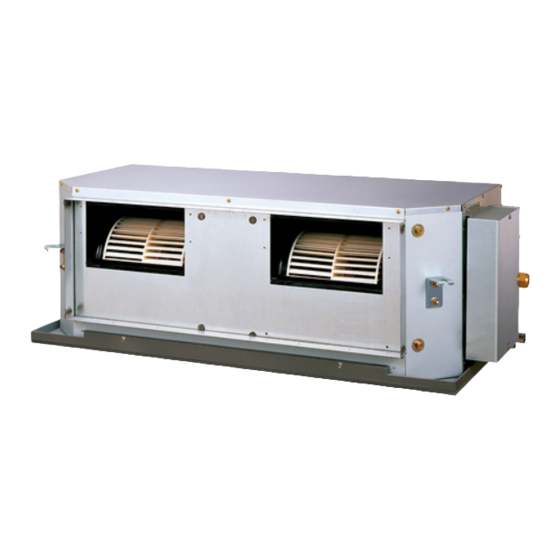Fujitsu ACY140HUIAT-LH Kullanım Kılavuzu - Sayfa 13
Klima Fujitsu ACY140HUIAT-LH için çevrimiçi göz atın veya pdf Kullanım Kılavuzu indirin. Fujitsu ACY140HUIAT-LH 16 sayfaları.

TROUBLESHOOTING
Instructions relating to heating (*) are applicable only to "HEAT & COOL MODEL" (Reverse Cycle).
WARNING
Before requesting service, perform the following checks:
Symptom
NORMAL
Does not operate immedi-
FUNCTION
ately:
Noise is heard:
Smells:
Mist or steam are emitted:
Airfl ow is weak or stops:
Water is produced from the
outdoor unit:
The FILTER indicator
blinks:
thermo sensor display
on the remote controller is
fl ashing:
CHECK ONCE
Does not operate at all:
MORE
Poor cooling (or heating*)
performance:
If the problem persists after performing these checks, or if you notice burning smells, stop operation immediately, disconnect the power
supply, and consult with authorized service personnel.
In the event of a malfunction (burning smell, etc.), immediately stop operation, turn off the electrical
breaker, and consult authorized service personnel.
Merely turning off the unit's power switch will not completely disconnect the unit from the power source.
Always be sure to turn off the electrical breaker to ensure that power is completely off.
If the unit is stopped and then immediately started again, the com-
●
pressor will not operate for about 3 minutes, in order to prevent fuse
blowouts.
Whenever the electrical breaker is turned off then on again, the protec-
●
tion circuit will operate for about 3 minutes, preventing unit operation
during that period.
During operation and immediately after stopping the unit, the sound
●
of water fl owing in the air conditioner's piping may be heard. Also,
noise may be particularly noticeable for about 2 to 3 minutes after
starting operation (sound of coolant fl owing).
*
During heating operation, a sizzling sound may be heard occasionally.
●
This sound is produced by the automatic defrosting operation.
Some smell may be emitted from the indoor unit. This smell is the
●
result of room smells (furniture, tobacco, etc.) which have been taken
into the air conditioner.
During cooling or dry operation, a thin mist may be seen emitted from
●
the indoor unit. This results from the sudden cooling of room air by
the air emitted from the air conditioner, resulting in condensation and
misting.
*
During heating operation, the outdoor unit's fan may stop, and steam
●
may be seen rising from the unit. This is due to the automatic defrost-
ing operation.
*
When heating operation is started, fan speed is temporarily very low,
●
to allow internal parts to warm up.
*
During heating operation, if the room temperature rises above the
●
thermostat setting, the outdoor unit will stop, and the indoor unit will
operate at very low fan speed. If you wish to warm the room further,
set the thermostat to a higher setting.
*
During heating operation, the unit will temporarily stop operation (be-
●
tween 4 and 15 minutes) as the automatic defrosting mode operates.
During the automatic defrosting operation,
remote controller display.
The fan may operate at very low speed during dry operation or when
●
the unit is monitoring the room's temperature.
In the monitor AUTO operation, the fan will operate at very low
●
speed.
*
During heating operation, water may be produced from the outdoor
●
unit due to the automatic defrosting operation.
Clean the fi lter. Afterwards, turn the FILTER indicator off.
●
The room temperature sensor may be malfunctioning. Please consult
●
authorized service personnel.
Has the circuit breaker been turned off?
●
Has there been a power failure?
●
Has a fuse blown out, or a circuit breaker been tripped?
●
Is the timer operating?
●
Is the air fi lter dirty?
●
Are the air conditioner's intake grille or outlet port blocked?
●
Did you adjust the room temperature settings (thermostat) correctly?
●
Is there a window or door open?
●
In the case of cooling operation, is a window allowing bright sunlight
●
to enter? (Close the curtains.)
In the case of cooling operation, are there heating apparatus and com-
●
puters inside the room, or are there too many people in the room?
Problem
will be shown on the
See Page
—
—
14
—
—
14
—
14
—
—
14
12
—
—
—
—
En-13
